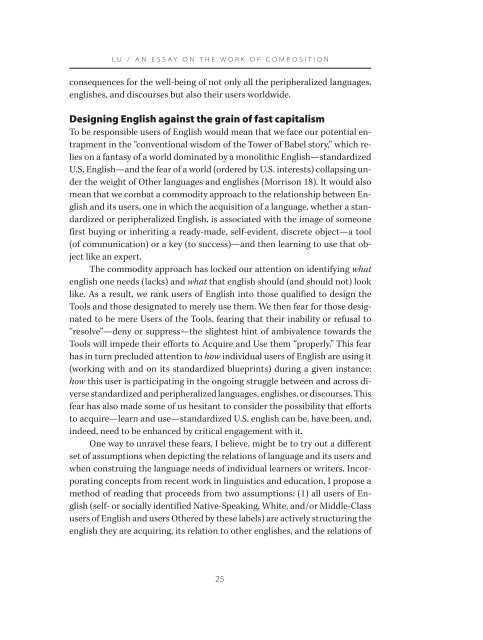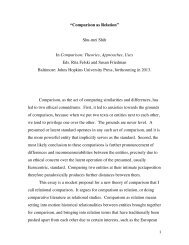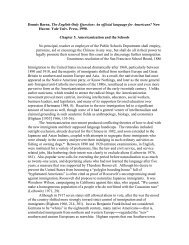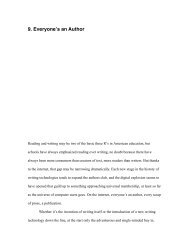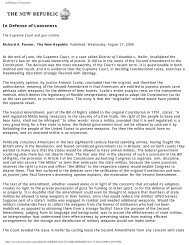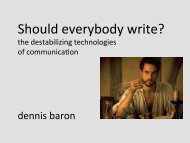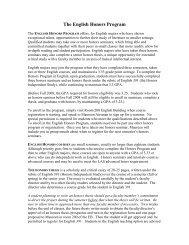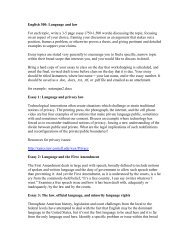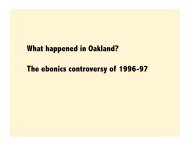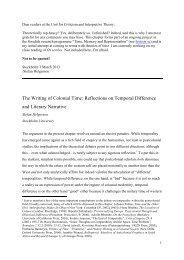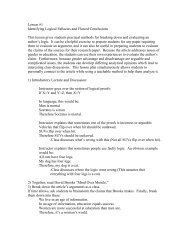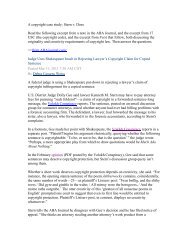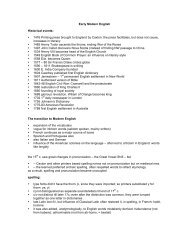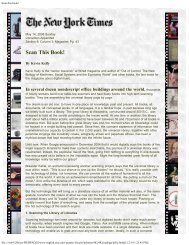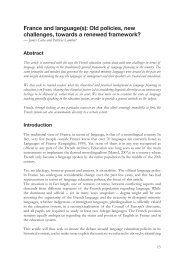An Essay on the Work of Composition: Composing English against ...
An Essay on the Work of Composition: Composing English against ...
An Essay on the Work of Composition: Composing English against ...
You also want an ePaper? Increase the reach of your titles
YUMPU automatically turns print PDFs into web optimized ePapers that Google loves.
LU / AN ESSAY ON THE WORK OF COMPOSITION<br />
c<strong>on</strong>sequences for <strong>the</strong> well-being <strong>of</strong> not <strong>on</strong>ly all <strong>the</strong> peripheralized languages,<br />
englishes, and discourses but also <strong>the</strong>ir users worldwide.<br />
Designing <strong>English</strong> <strong>against</strong> <strong>the</strong> grain <strong>of</strong> fast capitalism<br />
To be resp<strong>on</strong>sible users <strong>of</strong> <strong>English</strong> would mean that we face our potential entrapment<br />
in <strong>the</strong> “c<strong>on</strong>venti<strong>on</strong>al wisdom <strong>of</strong> <strong>the</strong> Tower <strong>of</strong> Babel story,” which relies<br />
<strong>on</strong> a fantasy <strong>of</strong> a world dominated by a m<strong>on</strong>olithic <strong>English</strong>—standardized<br />
U.S. <strong>English</strong>—and <strong>the</strong> fear <strong>of</strong> a world (ordered by U.S. interests) collapsing under<br />
<strong>the</strong> weight <strong>of</strong> O<strong>the</strong>r languages and englishes (Morris<strong>on</strong> 18). It would also<br />
mean that we combat a commodity approach to <strong>the</strong> relati<strong>on</strong>ship between <strong>English</strong><br />
and its users, <strong>on</strong>e in which <strong>the</strong> acquisiti<strong>on</strong> <strong>of</strong> a language, whe<strong>the</strong>r a standardized<br />
or peripheralized <strong>English</strong>, is associated with <strong>the</strong> image <strong>of</strong> some<strong>on</strong>e<br />
first buying or inheriting a ready-made, self-evident, discrete object—a tool<br />
(<strong>of</strong> communicati<strong>on</strong>) or a key (to success)—and <strong>the</strong>n learning to use that object<br />
like an expert.<br />
The commodity approach has locked our attenti<strong>on</strong> <strong>on</strong> identifying what<br />
english <strong>on</strong>e needs (lacks) and what that english should (and should not) look<br />
like. As a result, we rank users <strong>of</strong> <strong>English</strong> into those qualified to design <strong>the</strong><br />
Tools and those designated to merely use <strong>the</strong>m. We <strong>the</strong>n fear for those designated<br />
to be mere Users <strong>of</strong> <strong>the</strong> Tools, fearing that <strong>the</strong>ir inability or refusal to<br />
“resolve”—deny or suppress—<strong>the</strong> slightest hint <strong>of</strong> ambivalence towards <strong>the</strong><br />
Tools will impede <strong>the</strong>ir efforts to Acquire and Use <strong>the</strong>m “properly.” This fear<br />
has in turn precluded attenti<strong>on</strong> to how individual users <strong>of</strong> <strong>English</strong> are using it<br />
(working with and <strong>on</strong> its standardized blueprints) during a given instance:<br />
how this user is participating in <strong>the</strong> <strong>on</strong>going struggle between and across diverse<br />
standardized and peripheralized languages, englishes, or discourses. This<br />
fear has also made some <strong>of</strong> us hesitant to c<strong>on</strong>sider <strong>the</strong> possibility that efforts<br />
to acquire—learn and use—standardized U.S. english can be, have been, and,<br />
indeed, need to be enhanced by critical engagement with it.<br />
One way to unravel <strong>the</strong>se fears, I believe, might be to try out a different<br />
set <strong>of</strong> assumpti<strong>on</strong>s when depicting <strong>the</strong> relati<strong>on</strong>s <strong>of</strong> language and its users and<br />
when c<strong>on</strong>struing <strong>the</strong> language needs <strong>of</strong> individual learners or writers. Incorporating<br />
c<strong>on</strong>cepts from recent work in linguistics and educati<strong>on</strong>, I propose a<br />
method <strong>of</strong> reading that proceeds from two assumpti<strong>on</strong>s: (1) all users <strong>of</strong> <strong>English</strong><br />
(self- or socially identified Native-Speaking, White, and/or Middle-Class<br />
users <strong>of</strong> <strong>English</strong> and users O<strong>the</strong>red by <strong>the</strong>se labels) are actively structuring <strong>the</strong><br />
english <strong>the</strong>y are acquiring, its relati<strong>on</strong> to o<strong>the</strong>r englishes, and <strong>the</strong> relati<strong>on</strong>s <strong>of</strong><br />
25


